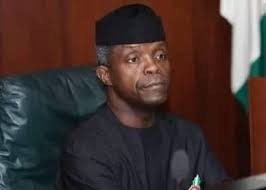President Muhammadu Buhari , on Monday said the Federal Government proposed in the 2020 Finance Bill to exempt minimum wage earners.
He said the move was to reduce the impact of inflation on Nigerians, adding that the initiative would exempt minimum wage earners from the Personal Income Tax.
Buhari disclosed this in his speech delivered virtually by Vice President Yemi Osinbajo, on Monday, at the opening session of the 26th Nigerian Economic Summit Group Conference themed ‘Building partnerships for resilience’.
Osinbajo also explained that the Federal Government would buy locally assembled cars rather than imported foreign ones.
He said, “We are proposing in the new Finance Act that those who earn minimum wage should be exempted from paying income tax.
“These provisions which complement the tax breaks given to small businesses last year will not only further stimulate the economy, but are also a fulfilment of promises made to take steps to help reduce the cost of transportation and the impact of inflation on ordinary Nigerians.”
The President stated that it was clear that Nigeria must diversify the economy away from dependence on crude oil exports, speed up human capital development and improve infrastructure.
“Above all, our economy must be made more resilient to exogenous shocks,” he said.
Buhari gave insights into the collaboration between the Central Bank of Nigeria, the Nigerian Sovereign Wealth Investment Authority and other stakeholders in the creation of an Infrastructure Company Fund to address some of the nation’s critical infrastructure needs.
He said the government was working actively with the CBN, NSIA and state governments under the auspices of the National Economic Council to design and put in place a N15tn Infrastructure Company Fund, which would be independently managed.
“The Infraco Fund will help to close the national infrastructural gap and provide a firm basis for increasing national economic productivity and growth,” the President explained.
Responding to the issue of import duties raised at the summit during the speech presentation, the Vice President explained that the reduction of import duty on vehicles would help cut down transportation cost.
“The point of the reduction in levies on motor vehicles, commercial vehicles for transportation is to reduce the cost of transportation by reducing the cost of vehicles,” Osinbajo said.
He added, “With subsidy removal and the increase in fuel price and the pass-through to food prices, transportation costs had to be reduced. Now the automotive policy is directed at localising the production of vehicles.
“So the logic was increase the duty and levies so that local production becomes more competitive. But the annual demand for vehicles is about 720,000 vehicles per year. Actual local production is 14,000 vehicles a year.”
He noted that the current rate of production would not meet the serious national needs and this would mean higher prices of vehicles and greater strain on other sectors of the economy that depend on transportation.
Osinbajo, however, stated that the government was not giving up on the local auto industry.
He said, “Two important things to note; the first is that we still have relatively high duty at 35 per cent; so, there is still a disincentive for importation.”
Osinbajo added that the government was also promoting a policy of buying only locally manufactured cars.


